

New World Order.
Economic. Earth Charter. History[edit] The idea of the Earth Charter originated in 1968, by Maurice Strong and Mikhail Gorbachev as members of The Club of Rome, when the United Nations World Commission on Environment and Development called for a new charter to guide the transition to sustainable development.
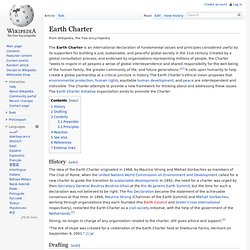
In 1992, the need for a charter was urged by then-Secretary General Boutros Boutros-Ghali at the Rio de Janeiro Earth Summit, but the time for such a declaration was not believed to be right. The Rio Declaration became the statement of the achievable consensus at that time. In 1994, Maurice Strong (Chairman of the Earth Summit) and Mikhail Gorbachev, working through organizations they each founded (the Earth Council and Green Cross International respectively), restarted the Earth Charter as a civil society initiative, with the help of the government of the Netherlands.[2] Strong, no longer in charge of any organization related to the charter, still gives advice and support.[2] UNITAR. UNOSAT is a technology-intensive programme delivering imagery analysis and satellite solutions to relief and development organisations within and outside the UN system to help make a difference in critical areas such as humanitarian relief, human security, strategic territorial and development planning.
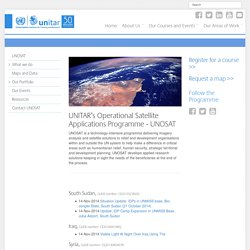
UNOSAT develops applied research solutions keeping in sight the needs of the beneficiaries at the end of the process. Syria, GLIDE number: CE20130604SYR Previous. Council on Foreign Relations. The Council on Foreign Relations (CFR) is an American nonprofit, nonpartisan membership organization, publisher, and think tank specializing in U.S. foreign policy and international affairs.
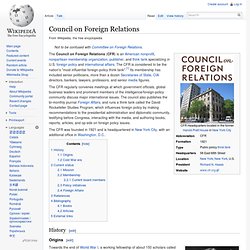
The CFR is considered to be the nation's "most influential foreign-policy think tank".[1] Its membership has included senior politicians, more than a dozen Secretaries of State, CIA directors, bankers, lawyers, professors, and senior media figures. The CFR regularly convenes meetings at which government officials, global business leaders and prominent members of the intelligence/foreign-policy community discuss major international issues. United Nations. The United Nations (UN) is an intergovernmental organization established on 24 October 1945 to promote international co-operation.
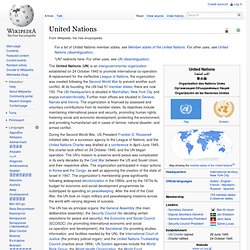
A replacement for the ineffective League of Nations, the organization was created following the Second World War to prevent another such conflict. At its founding, the UN had 51 member states; there are now 193. The UN Headquarters is situated in Manhattan, New York City and enjoys extraterritoriality. Further main offices are situated in Geneva, Nairobi and Vienna. The organization is financed by assessed and voluntary contributions from its member states. James Wolfensohn. James David Wolfensohn, KBE, AO (born 1 December 1933) is an Australian-American lawyer, investment banker and economist who served as the ninth president of the World Bank Group.
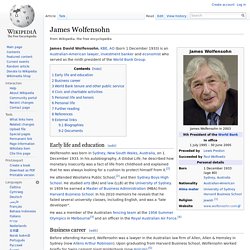
Early life and education[edit] Wolfensohn was born in Sydney, New South Wales, Australia, on 1 December 1933. In his autobiography, A Global Life, he described how monetary insecurity was a fact of life from childhood and explained that he was always looking for a cushion to protect himself from it.[2] He attended Woollahra Public School,[2] and then Sydney Boys High School. Ited Nations Millennium Development Goals. Disclaimer The United Nations is not responsible for the content of any messages posted on this site or sites linked from this page.
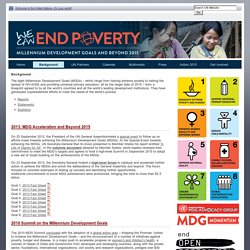
The inclusion of a message does not imply the endorsement of the message by the United Nations. The eight Millennium Development Goals (MDGs) – which range from halving extreme poverty to halting the spread of HIV/AIDS and providing universal primary education, all by the target date of 2015 – form a blueprint agreed to by all the world’s countries and all the world’s leading development institutions. They have galvanized unprecedented efforts to meet the needs of the world’s poorest. Trilateral Commission. The Trilateral Commission is a non-governmental, non-partisan discussion group founded by David Rockefeller[1] in July 1973, to foster closer cooperation among North America, Western Europe, and Japan.
History[edit] Founding[edit] Sensing a profound discord among the nations of North America, Europe and Japan, the Trilateral Commission was founded to foster substantive political and economic dialogue across the world. To quote its founding declaration: Federal Reserve System. The Federal Reserve System (also known as the Federal Reserve, and informally as the Fed) is the central banking system of the United States.
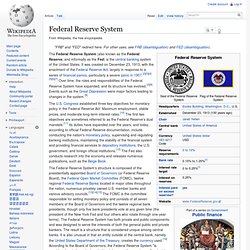
It was created on December 23, 1913, with the enactment of the Federal Reserve Act, largely in response to a series of financial panics, particularly a severe panic in 1907.[2][3][4][5][6][7] Over time, the roles and responsibilities of the Federal Reserve System have expanded, and its structure has evolved.[3][8] Events such as the Great Depression were major factors leading to changes in the system.[9] The U.S. Bilderberg Group. The Bilderberg Group, Bilderberg conference, Bilderberg meetings or Bilderberg Club is an annual private conference of approximately 120–150 political leaders and experts from industry, finance, academia and the media.[1][2] About two thirds of the participants come from Europe and the rest from North America; one third from politics and government and the rest from other fields.[1][3] §Origin[edit] The original conference was held at the Hotel de Bilderberg in Oosterbeek, Netherlands, from 29 to 31 May 1954.
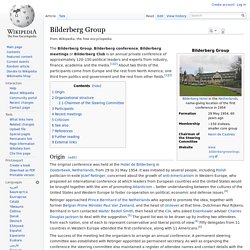
It was initiated by several people, including Polish politician-in-exile Józef Retinger, concerned about the growth of anti-Americanism in Western Europe, who proposed an international conference at which leaders from European countries and the United States would be brought together with the aim of promoting Atlanticism – better understanding between the cultures of the United States and Western Europe to foster co-operation on political, economic and defense issues.[4]